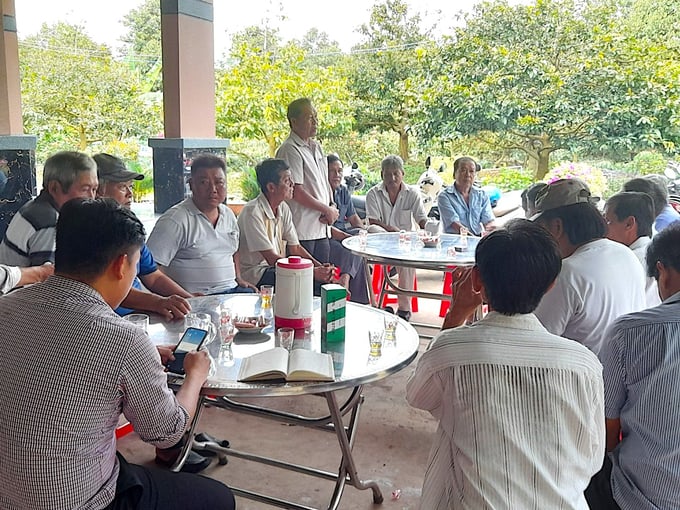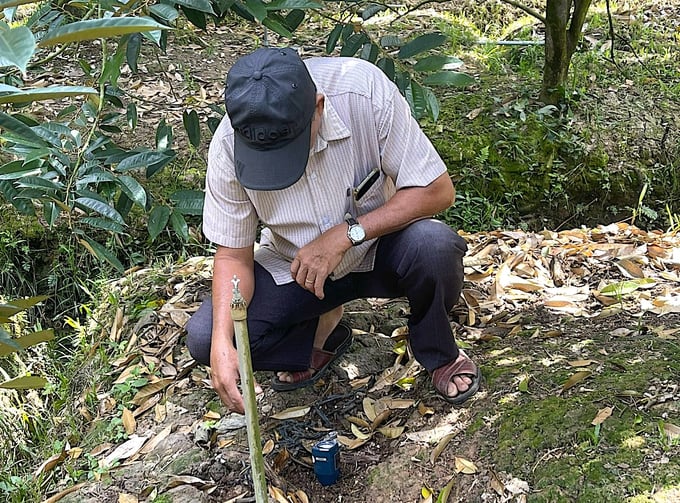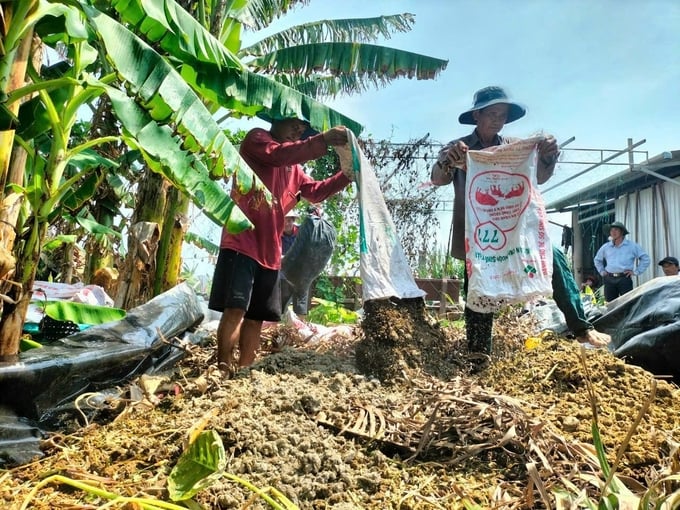May 24, 2025 | 16:25 GMT +7
May 24, 2025 | 16:25 GMT +7
Hotline: 0913.378.918
May 24, 2025 | 16:25 GMT +7
Hotline: 0913.378.918
The set of criteria for advanced new rural communes in Ben Tre province for the period 2021-2025 requires communes to have an effectively operating community agricultural extension (CAE) group to meet the standards. Based on this, the Provincial Agricultural Extension and Advisory Service Center has advised the Department of Agriculture and Rural Development to guide localities in implementing this criterion.

A technical transfer session of the Tan Phu Community Agricultural Extension Group (Chau Thanh district) with durian farmers. Photo: Minh Dam.
To date, the province has established approximately 115 out of 140 community agricultural extension groups (CAE) with about 800 members. Eleven pilot models have been built in 7 districts (excluding Binh Dai), with each district having 1-2 CAE groups to serve as a basis for expansion to other communes.
The Agricultural Advisory Service Department (Ben Tre Agricultural Extension and Advisory Service Center) collaborates with regional Agricultural Extension Stations to select and guide CAE groups in focusing their activities on products suited to local crops and in developing product advisory skills. Additionally, they provide training on establishing planting area codes and linking with some enterprises.
Ben Tre now has several outstanding and highly effective CAE groups, such as Tan Thieng and Phu Phung (Cho Lach district), An Hiep and Tan Phu (Chau Thanh district), and An Thuan (Thanh Phu district).
These CAE groups have linked with input enterprises to purchase fertilizers and plant protection drugs. Groups like Tan Phu, Quoi Thanh, and An Hiep have enhanced their advisory services, supporting farmers with branch pruning services for some fruit trees and crop care solutions under saline drought conditions.
Additionally, many groups have coordinated fruit consumption, supported farmers in developing agricultural and rural tourism, and linked value chains, especially the organic coconut value chain, and are now moving towards the fresh coconut chain. Furthermore, the groups have connected with banks to implement low-interest credit policies for farmers during production.

Officers of the Tan Phu Community Agricultural Extension Group are measuring the soil pH in a durian orchard belonging to a farmer. Photo: Minh Dam.
Phu Phung (Cho Lach district) is an agricultural commune with rambutan as its main fruit crop. In 2023, the Phu Phung CAE group collaborated with the Cho Lach - Mo Cay Bac Agricultural Extension Station to conduct three training sessions for 150 farmers on methods of care and drought-saline prevention for crops and livestock.
Additionally, the Phu Phung CAE group partnered with enterprises to implement demonstration models for transferring scientific and technical knowledge to farmers. Notably, Thai Thi Agriculture Company provided 100% funding for 10 households to implement soil improvement models and control pesticide residues in orchards affected by saline water from eel farming, with a budget of 70 million VND. The company also offered more than 20 tons of organic fertilizer and 100 buckets of fish emulsion (20 liters/bucket) to farmers at a preferential price, with a budget of 240 million VND.
Beyond providing advice and transferring scientific and technical knowledge, the Phu Phung CAE group has also collaborated with the Farmers' Association and the Provincial Crop Production and Plant Protection Sub-Department to encourage farmers to establish concentrated production areas for rambutan and durian.
In 2023 and the first quarter of 2024, they established two production areas following VietGAP standards, covering 72.6 hectares and involving 139 households. Additionally, they secured four planting area codes for rambutan covering 47 hectares and involving 104 households, meeting export standards to markets such as the U.S., China, and New Zealand. The group also partnered with cooperatives to ensure product consumption for farmers, purchasing over 20 tons of durian and 10 tons of rambutan to date.

The CAE group is instructing farmers on how to compost organic fertilizer in Giong Trom district. Photo: Tri Nhan.
According to Mr. Chau Huu Tri, Director of the Ben Tre Provincial Agricultural Extension and Advisory Service Center, the CAE groups are considered an extension of the agricultural extension system, effectively and quickly disseminating scientific and technical advancements to farmers, businesses, cooperatives, and cooperative groups.
Recently, the CAE groups have played a key role in organizing consultations, technical transfers, and linking value chains for the main products of the communes, helping cooperative groups and cooperatives operate effectively.
However, since these groups are newly established and operational, they face many difficulties in directing and managing activities. They have not yet fulfilled four main tasks: market linkage, cooperative advisory services, training "digital farmers," and other political tasks. Additionally, members of the groups lack the knowledge needed to perform their functions, especially in market development, cooperative management, value chain linkage, quality management, traceability, and digital transformation in agricultural production.
To ensure the strong and sustainable development of CAE groups in the future, the most important factor is to have appropriate policies for the participating members. Members need to be dedicated, experienced, enthusiastic, responsible, and skilled in their activities. The groups need to be cohesive, unified, and cooperative in local tasks. They also need training in basic skills and procedures such as consulting, promotion, networking, technology, economics, and planning.
According to Mr. Đoan Van Đanh, Director of the Ben Tre Provincial Department of Agriculture and Rural Development, it is essential to continue enhancing the effectiveness of existing CAE groups and to establish more in the remaining communes of the province, potentially with two groups per commune. This is a crucial factor in helping cooperative groups and cooperatives operate efficiently, linking with the value chains of key agricultural products, and contributing to the successful construction of new rural communes.
Translated by Mai Quang Huy

(VAN) The People's Committee of Tra Vinh province has approved an adjustment to the investment policy for the Green Hydrogen Plant project, increasing its area to approximately 52.76 hectares.
![Reducing emissions from rice fields: [2] Farmers’ commitment to the soil](https://t.ex-cdn.com/nongnghiepmoitruong.vn/608w/files/news/2025/05/05/dsc08881jpg-nongnghiep-140632.jpg)
(VAN) Clean rice cultivation model in Thuong Tan commune, Bac Tan Uyen district, is assisting local residents in achieving sustainable agriculture by substantially reducing costs, increasing productivity, and protecting the environment.

(VAN) At the conference to disseminate Resolution No. 68, AgriS introduced its digital agricultural ecosystem and reaffirmed its commitment to accompanying the Government in promoting private sector development and sustainable agriculture.

(VAN) 'Blue Ocean - Blue Foods' initiative is designed to restore marine ecosystems and establish sustainable livelihoods for local communities by cultivating a minimum of 1,000 hectares of cottonii seaweed in the first three years.
/2025/05/21/4642-3-112707_603.jpg)
(VAN) The V-SCOPE project has made direct contributions to three out of six pillars of the Comprehensive Strategic Partnership between Vietnam and Australia.

(VAN) Facing the threat of rabies spreading to the community, Gia Lai province urgently carries out measures to vaccinate dogs and cats on a large scale.

(VAN) Disease-free livestock farming not only protects livestock herds but also stabilizes production and livelihoods for many farmers in Tuyen Quang.